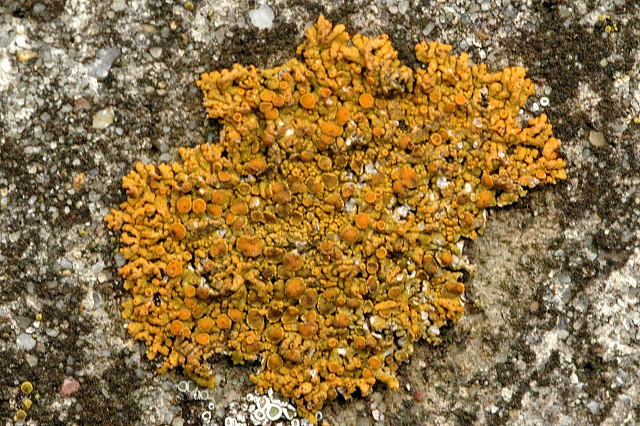Difference between revisions of "Template:POTD protected"
Westarctica (talk | contribs) |
Westarctica (talk | contribs) |
||
| Line 1: | Line 1: | ||
{| role="presentation" style="margin:0 3px 3px; width:100%; text-align:left; background-color:transparent; border-collapse: collapse; " | {| role="presentation" style="margin:0 3px 3px; width:100%; text-align:left; background-color:transparent; border-collapse: collapse; " | ||
|style="padding:0 0.9em 0 0;" | [[File: | |style="padding:0 0.9em 0 0;" | [[File:Caloplaca.saxicola.jpg|thumb|300px]] | ||
|style="padding:0 6px 0 0"| | |style="padding:0 6px 0 0"| | ||
'''''[[Caloplaca saxicola]]''''' is a small bright orange crustose [[lichen]] that grows on rock all over the world, including [[Antarctica]]. It is commonly called rock firedot lichen, jewel lichen or rock jewel lichen. It has short, inflated looking elongate 1–2 mm and .3-.1 mm wide lobes that have an abrupt margin at the edge, and no prothallus. | |||
''C. saxicola'' is one of the few [[lichen]]s found in [[Westarctica]], and is likely the most southerly plant life. The [[Caloplaca Hills]] were named for this lichen, which grows on the rocks there. This lichen occurs over a portion of northern North America as far north as the Canadian Boreal forests, where Black Spruce is a dominant tree. In California, it is one of the most common saxicolous lichens. | |||
<p><small> | |||
<p><small>Photographer: James K. Lindsey</small></p> | |||
[[:Category:Images|'''(More Images)''']] | [[:Category:Images|'''(More Images)''']] | ||
<div class="potd-recent" style="text-align:right;"> | <div class="potd-recent" style="text-align:right;"> | ||
Revision as of 08:06, 13 December 2021
|
Caloplaca saxicola is a small bright orange crustose lichen that grows on rock all over the world, including Antarctica. It is commonly called rock firedot lichen, jewel lichen or rock jewel lichen. It has short, inflated looking elongate 1–2 mm and .3-.1 mm wide lobes that have an abrupt margin at the edge, and no prothallus. C. saxicola is one of the few lichens found in Westarctica, and is likely the most southerly plant life. The Caloplaca Hills were named for this lichen, which grows on the rocks there. This lichen occurs over a portion of northern North America as far north as the Canadian Boreal forests, where Black Spruce is a dominant tree. In California, it is one of the most common saxicolous lichens.
Photographer: James K. Lindsey |
